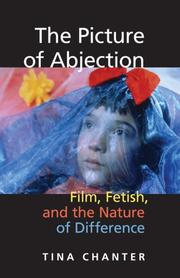| Listing 1 - 6 of 6 |
Sort by
|
Book
ISBN: 1784997722 1526109867 9781526109866 9781784997724 9780719096280 0719096286 9780719096297 0719096294 Year: 2017 Publisher: Manchester
Abstract | Keywords | Export | Availability | Bookmark
 Loading...
Loading...Choose an application
- Reference Manager
- EndNote
- RefWorks (Direct export to RefWorks)
Here, an impressive list of authors examine how abjection can be discussed in relation to a host of different subjects, including marginality and gender.
Abjection in literature. --- Abjection in motion pictures. --- Art. --- Culture.
Book
ISBN: 0230389333 9780230389335 Year: 2014 Publisher: Basingstoke: Palgrave MacMillan,
Abstract | Keywords | Export | Availability | Bookmark
 Loading...
Loading...Choose an application
- Reference Manager
- EndNote
- RefWorks (Direct export to RefWorks)

ISBN: 0253219183 9780253219183 9780253349170 0253349176 0253027772 Year: 2008 Publisher: Bloomington Indiana university press
Abstract | Keywords | Export | Availability | Bookmark
 Loading...
Loading...Choose an application
- Reference Manager
- EndNote
- RefWorks (Direct export to RefWorks)
Abjection in motion pictures. --- Sex in motion pictures. --- Abjection au cinéma --- Sexualité au cinéma --- Abjection au cinéma --- Sexualité au cinéma --- Abjection in motion pictures --- Sex in motion pictures --- Sex in moving-pictures --- Motion pictures --- Erotic films --- Pornographic films
Book
ISBN: 9780230600089 0230600085 Year: 2008 Publisher: Basingstoke : Palgrave Macmillan,
Abstract | Keywords | Export | Availability | Bookmark
 Loading...
Loading...Choose an application
- Reference Manager
- EndNote
- RefWorks (Direct export to RefWorks)
Using Lacanian psychoanalysis and queer theory to explore the unstable relationship between heterosexual masculine identity and cultural representation, this book examines the ways straight men are queered and abjected in literature, theory, and film.
Book
ISBN: 9789052010625 9052010625 Year: 2007 Volume: 3 Publisher: Bruxelles Bern Berlin ... PIE-Peter Lang
Abstract | Keywords | Export | Availability | Bookmark
 Loading...
Loading...Choose an application
- Reference Manager
- EndNote
- RefWorks (Direct export to RefWorks)
Shame and Desire defines the contemporary cinematic experience in terms that go beyond the visual. Adopting an intersubjective perspective on film studies, the author maintains that the dialectical poles of subject and object, seeing and being seen no longer seem to be valid. We are now surrounded by images that look back at us provocatively, seductively, indifferently ; and not only in movies, but also in art, television, the city, in chance encounters, and in our private relationships.Taking her cue from Jean-Paul Sartre, the author shows how emotions exemplify the way in which we are ‘forced' to see ourselves through the eyes of others, unable to escape an identity that is imposed upon us from the outside but nevertheless resides ‘in the flesh' – in the affective operations of the body and the senses. To illustrate her account of the intersubjective dynamics and affective bonds of cinema, the author explores the contemporary aesthetic investment in the emotional in the work of filmmakers such as Lars von Trier, Michael Haneke and Eija-Liisa Ahtila.This book proposes an insight into the ways in which we are engaged with visual displays and the look with which they respond to our looking.
Abjection dans le cinéma --- Abjection in motion pictures --- Blik in de film --- Gaze in motion pictures --- Regard au cinéma --- Verworpenheid in de film --- Motion pictures --- Gaze in motion pictures. --- Abjection in motion pictures. --- Cinéma --- Abjection au cinéma --- Psychological aspects. --- Aspect psychologique --- film --- filmtheorie --- identiteit --- von Trier Lars --- Haneke Michael --- Ahtila Eija-Liisa --- intersubjectiviteit --- 791.41 --- Cinéma --- Regard au cinéma --- Abjection au cinéma --- Psychological aspects --- Motion pictures - Psychological aspects
Book
ISBN: 9783631628379 Year: 2015 Publisher: Frankfurt am Main : PL Academic Research,
Abstract | Keywords | Export | Availability | Bookmark
 Loading...
Loading...Choose an application
- Reference Manager
- EndNote
- RefWorks (Direct export to RefWorks)
In this study, the author examines works of German-language literature and film from the nineteenth and twentieth century in order to chart a certain kind of otherness. Common to all of the examined cultural products are aspects of gender, sexuality, a notion of home or belonging, and pressures of abjection. Other elements of identity include race and disease. The characters in the analyzed works encounter both mutual dependence and abhorrence, which complicate their experiences in space and time. This analysis demonstrates that acceptance and belonging are difficult to attain, particularly in the fraught power dynamics in these works. This book includes discussions of works by Frank Wedekind, Robert Musil, Kutluğ Ataman, and Pierre Sanoussi-Bliss.
German literature --- Identity (Psychology) in literature. --- Gender identity in literature. --- Abjection in literature. --- Subjectivity in literature. --- Uncanny, The (Psychoanalysis), in literature. --- Motion pictures --- Identity (Psychology) in motion pictures. --- Gender identity in motion pictures. --- Abjection in motion pictures. --- Subjectivity in motion pictures. --- History and criticism. --- History. --- History and criticism --- History
| Listing 1 - 6 of 6 |
Sort by
|

 Search
Search Feedback
Feedback About UniCat
About UniCat  Help
Help News
News